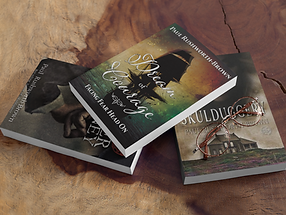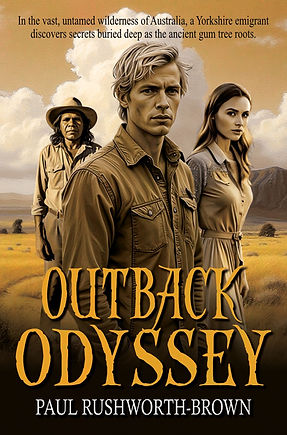Easter: The Celebration of the Resurrection of Christ or the Pagan Goddess Eostre ?
- Paul Rushworth-Brown
- Apr 5, 2024
- 5 min read

Easter: The Celebration of the Resurrection of Christ or the Pagan Goddess Eostre. Regularly observed from the earliest days of the Church, Easter celebrates Christ’s resurrection from the dead, following crucifixion. It marks the end of Holy Week, the end of Lent, and the last day of the Easter Triduum (starting from the evening of Maundy Thursday, through Good Friday, Holy Saturday, and Easter Sunday), as well as the beginning of the Easter season of the liturgical year.
In the New Testament (1 Corinthians 5:7), Paul connects the resurrected Christ to Passover. He refers to Jesus as the paschal lamb who has been sacrificed for his people’s salvation. Jesus celebrated the Last Supper with his disciples during Passover, so it makes sense that the Feast of the Resurrection is connected with the Jewish holiday. Today, Christians celebrate the “Paschal mystery.”
Easter is the most important feast day in the Christian calendar; however, a quick google search on the ‘pagan origins of Easter’ will yield a plethora of articles from various sources all repeating the same information about the pagan origin's of Easter.
Between the 5th and 8th century a variant of Germanic paganism spread across much of north-western Europe, it encompassed a heterogeneous variety of beliefs and cultic practices, with much regional variation.
Some academics have reported the name 'Easter' is derived from 'Eostre', the name of the pagan fertility goddess. The Germanic goddess of dawn who is celebrated during the Spring Equinox on the old Germanic calendar. The equivalent month to April was called “Eostarmānod” – or Easter-month named after her. As a holiday, some have argued that Easter predates Christianity and was originally the name for Spring Equinox celebrations and provides evidence for the pagan celebrations and beginnings of what we now know as Easter.

Others dispute this origin of Easter as the only source of this is an 8th century English monk called the Venerable Bede. Prior to Bede, there is no mention in any Germanic, Celtic, or English ancient literature about this goddess or Eostarmānod celebrations; however, this is not to say there wasn't any. It is odd though considering the literature is otherwise filled with the beliefs and religious practices of pagan groups at the time. Interestingly, there is not a single reference to her, from the Anglo-Saxon Chronicles, any of the other writings we have from the period, or from inscriptions, no depiction, no amulets nothing and one would think that the 'goddess of fertility' would be quite important to these people.

In AD 595, Pope Gregory sent a mission of 40 monks led by a Benedictine called Augustine to England with instructions to convert the pagan inhabitants to Christianity. Augustine was advised to allow the outward forms of the old, heathen festivals and beliefs to remain intact, but wherever possible to superimpose Christian ceremonies and philosophy on them.
Pope Gregory’s mandate of conversion through coercion was brilliant in its simplicity: he surmised that the easy-going but deeply superstitious Anglo-Saxon peasants would not object if the seasonal festivals of the pagan calendar were Christianised, provided the ancient celebrations remained basically unchanged. Gradually, the main heathen feasts became days honouring Christ or one of the Christian saints.
Bede like Pope Gregory, may have supported the pagan celebrations to persist where it did not impact on Christian doctrine. Let us suppose for an instant that pagan's did worship this goddess and used the name of her month Eostarmānod” – or Easter-month for the new Christian festival given that it fell around the same time of year. The leap from this to claiming the festival itself was somehow ‘pagan’ maybe false as Christians had been celebrating Easter since at least the second century AD. Contrasting this it has been reported that the practices of paganism were followed by the Anglo-Saxon’s between the 5th and 8th centuries.
It seems the only thing the goddess Eostre seems to have given to Easter is her name.

Available in both Paperback and e-book
Skulduggery-
"Skulduggery" (2021): Set in 17th-century Yorkshire, this novel follows William and his family as they navigate rural life during a time of political and social upheaval. The book is noted for its historical authenticity and engaging storytelling.
Set in Haworth, a family of Yorkshire peasants in 1590, live each day in isolation from the village, but an attack on one of their own puts them all in grave danger. This story carefully navigates the backdrop of the English Reformation, populating it with likable and despicable characters, and casting them in a fully realised historical mystery setting. It's a slice of history that's totally, utterly believable, and unbelievable. The twists will surprise and the ending is totally unexpected even for the most astute of readers.
"A glorious read of a period well versed and presented with accuracy and authentic telling by an author who is as much engrossed in his prose as the reader he shares with...masterful and thoroughly enjoyable...5 stars." Adrian, Indibook reviewer.
Red Winter Journey-
This novel, set against the backdrop of the English Civil War, explores love and survival amidst the chaos of war. It combines historical events with personal narratives, highlighting the impact of conflict on individuals and families.
England, 1642. When bloody civil war breaks out between the King and Parliament, families and communities are driven by different allegiances. Red Winter Journey is a sweeping tale of adventure and loss, sacrifice and love, with a unique and unforgettable story of a mother’s love for her son at its heart. A historic journey of twists, turns and a dash of spirited passion
"A fictional, historical novel about a loving peasant family caught up in a 1642 shocking English Civil War. Humour, romance, adventure and excitement are here to enjoy. A great story.
Dream of Courage-
Protagonists: The characters are depicted with a strong sense of realism, embodying the virtues and vices of ordinary people. Their development throughout the story reflects their responses to the harsh realities they face.
Antagonists: Often represented by external forces such as oppressive landowners or soldiers, the antagonists serve to highlight the social and political struggles of the time.
Dive into the captivating world of the English wool industry with this imaginative and fictional narrative. Discover the ingenuity and vibrant history of a cornerstone of English heritage, woven through the lives of unforgettable characters and dramatic events.
This tale masterfully blends fact with fiction, offering a unique and enthralling perspective on the industry that shaped a nation. Young Robert Rushworth and John Rushworth leave home and stumble across a way to make their fortune, in the Briggate in Leeds. Pursued by Jacob Wilding, a brogger and brute of a man, with no manners or decorum, typical of the ‘lower sort’ of the time. Smythe, the local tavern keeper, has many secrets and with a hidden past, sends Robert to The Haven, to Captain Girlington of 'The Pearl'. Will Robert escape before it's too late? Will he hang? Will Robert and Ursula ever be together?
Coming soon:
Rushworth-Brown is working on two new projects that promise to captivate his audience even further. "Outback Odyssey" tells the story of a young man from Yorkshire who emigrates to Australia in the 1950s under the Big Brother Movement scheme. Working on a sheep station with Aboriginal stockmen, he learns the ways of the outback and pursues the legend of Wiberg's Gold. This novel promises to combine the rich historical detail Rushworth-Brown is known for with the rugged allure of the Australian wilderness.
Another work in progress, "Shadows of Destiny," is based on a true story and delves into the tale of the Cragg Vale Coiners. This narrative is told from the perspective of James Broadbent, who betrayed the Coiners, and the Marquess of Rockingham and Charles Watson-Wentworth, who were charged with finding them. This upcoming novel is expected to offer a fresh perspective on a notorious chapter in British history, showcasing Rushworth-Brown's ability to explore complex characters and moral ambiguities within historical contexts.
With these exciting new projects, Paul Rushworth-Brown continues to prove his prowess as a storyteller who not only brings history to life but also makes it resonate with contemporary readers. His work is a testament to historical fiction's enduring power to educate, entertain, and inspire.





.png)

.png)


.png)
.png)



.png)







Interesting article😀
Just like last night, slow start, strong finish! Love you Paul!
Bless,